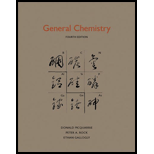
Concept explainers
(a)
Interpretation:
The reaction of barium carbonate to barium oxide and carbon dioxide has to be classified as combination, decomposition, single replacement or double replacement reaction and the reaction has to be balanced.
Concept Introduction:
Combination reactions: In these reactions, the reactant combines to form a single product. This type of reaction occurs between either two elements, an element and a compound or two compounds. It is recognized easily because it involves two reactants and only a single product.
Decomposition reactions: Decomposition reactions are the opposite of a combination reaction because decomposition reaction involves the breaking apart of a substance into simpler substances. Such a reaction is easy to recognize because there is one reactant and more than one product.
Single replacement reactions: A reaction where an element in a compound is replaced by another element is called single replacement reaction or a substitution reaction. It generally involves between a dilute solution of an acid and a metal.
Double replacement reactions: This type of reactions occurs when the cation and the anions switch between two reactants to form new products. In order for the reaction to occur, one of the products is usually a solid precipitate, a gas or a molecular compound.
(b)
Interpretation:
The reaction of formation of iron oxide from iron and oxygen has to be classified as combination, decomposition, single replacement or double replacement reaction and the reaction has to be balanced.
Concept Introduction:
Refer to part (a).
(c)
The reaction of formation of aluminium oxide and manganese from manganese oxide and aluminium has to be classified as combination, decomposition, single replacement or double replacement reaction and the reaction has to be balanced.
Concept Introduction:
Refer to part (a).
(d)
Interpretation:
The reaction of formation of silver sulphate and nitric acid from sulphuric acid and silver sulphate has to be classified as combination, decomposition, single replacement or double replacement reaction and the reaction has to be balanced.
Concept Introduction:
Refer to part (a).
Want to see the full answer?
Check out a sample textbook solution
Chapter 10 Solutions
General Chemistry
 ChemistryChemistryISBN:9781305957404Author:Steven S. Zumdahl, Susan A. Zumdahl, Donald J. DeCostePublisher:Cengage Learning
ChemistryChemistryISBN:9781305957404Author:Steven S. Zumdahl, Susan A. Zumdahl, Donald J. DeCostePublisher:Cengage Learning ChemistryChemistryISBN:9781259911156Author:Raymond Chang Dr., Jason Overby ProfessorPublisher:McGraw-Hill Education
ChemistryChemistryISBN:9781259911156Author:Raymond Chang Dr., Jason Overby ProfessorPublisher:McGraw-Hill Education Principles of Instrumental AnalysisChemistryISBN:9781305577213Author:Douglas A. Skoog, F. James Holler, Stanley R. CrouchPublisher:Cengage Learning
Principles of Instrumental AnalysisChemistryISBN:9781305577213Author:Douglas A. Skoog, F. James Holler, Stanley R. CrouchPublisher:Cengage Learning Organic ChemistryChemistryISBN:9780078021558Author:Janice Gorzynski Smith Dr.Publisher:McGraw-Hill Education
Organic ChemistryChemistryISBN:9780078021558Author:Janice Gorzynski Smith Dr.Publisher:McGraw-Hill Education Chemistry: Principles and ReactionsChemistryISBN:9781305079373Author:William L. Masterton, Cecile N. HurleyPublisher:Cengage Learning
Chemistry: Principles and ReactionsChemistryISBN:9781305079373Author:William L. Masterton, Cecile N. HurleyPublisher:Cengage Learning Elementary Principles of Chemical Processes, Bind...ChemistryISBN:9781118431221Author:Richard M. Felder, Ronald W. Rousseau, Lisa G. BullardPublisher:WILEY
Elementary Principles of Chemical Processes, Bind...ChemistryISBN:9781118431221Author:Richard M. Felder, Ronald W. Rousseau, Lisa G. BullardPublisher:WILEY





